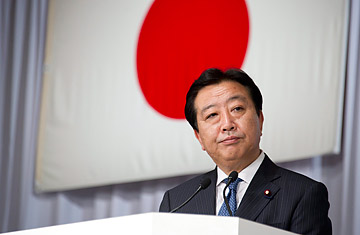
Japanese Finance Minister Yoshihiko Noda listens to a question from the press after winning the Democratic Party of Japan (DPJ) presidential election in Tokyo, Japan, August 29, 2011.
All bets are on Yoshihiko Noda to become Japan's next prime minister after he won the presidential election of the ruling Democratic Party of Japan on Monday. Noda, 54, took the majority vote in a runoff. Lawmakers in the Upper and Lower Houses of Parliament will likely give their approval for Noda's post as prime minister on Tuesday. He will then be Japan's sixth prime minister in five years.
As the present Finance Minster, Noda's win appears to reflect major concern about Japan's embattled economy. The head of the nation's most powerful branch of the bureaucracy since June 2010, Noda has overseen efforts to revive the nation's poor fiscal health. Japan is now afflicted with a debt twice the size of its economy, and the worst among the developed countries. Moody's Investor Service cut the nation's credit rating last week in light of the country's bulging debt, political instability and the lack of an established plan to stabilize the world's third largest economy.
Noda's rise reflects another development — which could affect the longevity of his premiership. He was not the candiate of the DPJ's kingmaker, the so-called Shadow Shogun, Ichiro Ozawa, who had thrown his support to Trade Minister Banri Kaieda. Ozawa, who espouses hardline attitudes toward the U.S. and China, had made a bid to come out of the shadows and contest the leadership of the party in 2010 but was defeated. Nevertheless, he still controls the party's largest faction of more than 100 lawmakers, about one-fourth the total number.
Can Noda lead? Analysts are not sanguine. "He emerged as a compromise," says Jeff Kingston, Director of Asian studies at Temple University Japan. "He's not charismatic, or a populist or a good communicator, [and] not a particularly bold or visionary leader. He's sort of a 'Steady Eddy' and doesn't raise expectations that much. Maybe in the context of Japanese politics, that's the best you can hope for."
While Noda could be filling the prime minister's seat for the next two years as DPJ elected head, opinions are mixed on how long he will actually last as prime minister. "Noda is a typical, simple, honest person but at the same time he is very stubborn," says Takao Toshikawa, editor of the political newsletter Tokyo Insideline. "But among the five candidates who ran for DPJ party head I think he has the strongest leadership ability and will continue as prime minister for two more years, maybe more." Says Yoshi Yamamoto, a political advisor to DPJ congressmen: "Noda seems a bit like the former LDP prime minister Keizo Obuchi [in the 1990s], generally known internationally as a 'cold pizza,' but respected domestically by working level staffers and officials as someone who listens and rewards."
A fiscal conservative, Noda has been a staunch supporter of hiking taxes rather than more borrowing. His win raises the possibility of a tax increase that would help fund reconstruction from the earthquake and tsunami (with an estimated cost of almost 20 trillion yen over the next five years) and pay for the nation's ballooning health and social security costs in one of the world's most rapidly aging societies.
The rising yen has also weakened the country's export-led economy. As a counter to this, Noda favors the Trans-Pacific Partnership (TPP) as a way of liberalizing the economy, improving Japanese competitiveness abroad and opening up free trade. But this move would not be a short-term cure. Nevertheless, Takuji Okubo, chief economist at Societe Generale Securities in Tokyo told Reuters, "Of the five candidates, Noda was the best choice for Japan's economy."
The economy, however, is only one portion of a bevy of problems Noda must navigate after he takes the helm as prime minister. Besides the stagnant economy, high public debt, rising yen, slow reconstruction in the disaster-hit Tohoku region, and nuclear crisis, there is rampant infighting within the DPJ and a gridlocked Parliament. "The real problem is that Noda is being handed a poisoned chalice," says Kingston. "The key is whether the DPJ can unite and whether it can work with the opposition Liberal Democratic Party (LDP) in Parliament."
"Unfortunately, 'politics with a deep grudge' remain within the DPJ," says Toshikawa. "The party will remain divided unless the bickering between the pro- and anti-Ozawa camps ends." Dubbed the kingpin of Japan's political world over the last several decades, Ozawa has been suspended from the DPJ pending a funding scandal investigation. The defeat of his candiate Kaidea may indicate a slip in the powerbroker's hold over the party. "But Ozawa will not give up," says Shinichi Nishikawa, professor of politics at Meiji University in Tokyo. "He has a lot of resources and is always ambitious."
